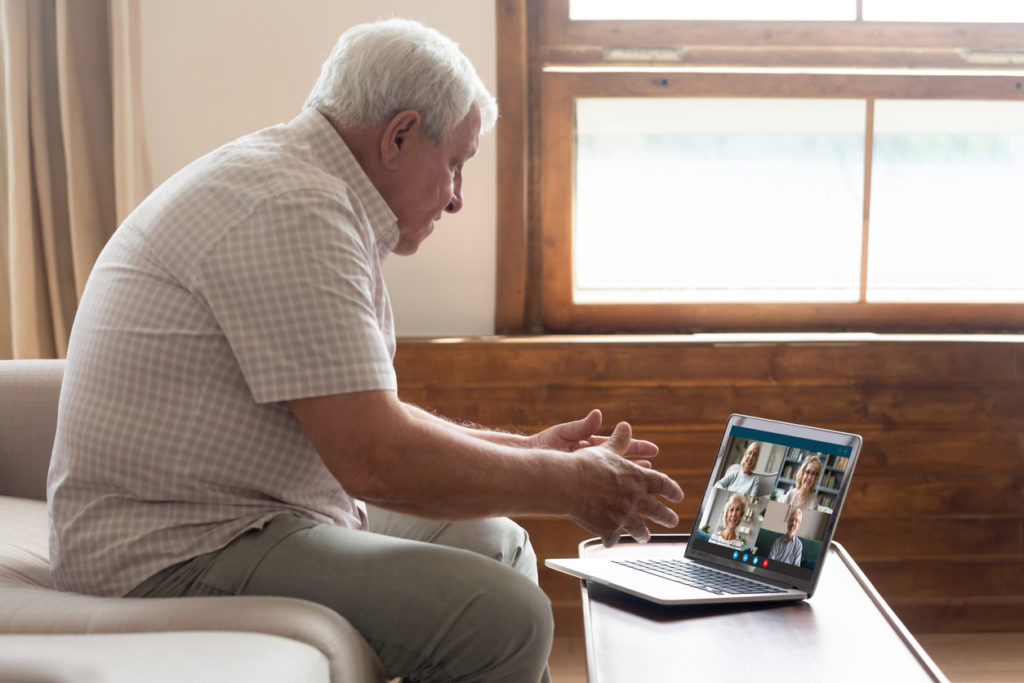Many of the Nation’s Nursing Homes Had a Bad Record Before COVID — Now Hit With an Alarming Spike in New COVID Cases

Virtually visiting
The agency that represents 14,000-plus nursing homes across the country recently released a revealing report related to COVID-19 that does not bode well for the facilities entrusted with the care of the elderly.
The report shows coronavirus cases have been on the rise in nursing home since June – in direct relation to increased community spread. As of mid-July, the latest date for which figures are available, the number of coronavirus cases in such facilities hovered at 8,628.
“The American Health Care Association and National Center for Assisted Living (AHCA / NCAL), representing more than 14,000 nursing homes and assisted living communities across the country that provide care to approximately five million people each year, released a report today showing nursing homes in the U.S. have experienced an alarming spike in new COVID cases due to community spread among the general population according to recent data recently released from the Centers for Medicare & Medicaid Services (CMS),” states the report, titled “DATA: Nursing Homes See Spike in New COVID Cases Due to Community Spread.” “The CMS data shows COVID cases in nursing homes significantly increased last month after having dropped significantly throughout the month of June. As experts have repeatedly noted, COVID-19 cases in a surrounding community is a top factor in outbreaks in nursing homes.”
Mark Parkinson, president and CEO of the AHCA / NCAL, expressed frustration at the daunting data.
“With the recent major spikes of COVID cases in many states across the country, we were very concerned this trend would lead to an increase in cases in nursing homes and unfortunately it has,” Parkinson said in the report.
Fearing an unfair fight with an invisible enemy because of the lack protective personal equipment (PPE), he sent a letter to the National Governors Association warning of more outbreaks and cautioning against the premature re-opening of nursing homes.
“Given the fact we are several months into the response of this pandemic and the lack of PPE supplies is still an issue is very concerning,” he said in the letter. “We request governors and state public health agencies help secure and direct more PPE supplies to nursing homes and assisted living communities. With major spikes in cases in several states as well as significant upticks in many counties across the country, we are very concerned about reopening many long term care facilities. In order to protect our residents and caregivers, state public health agencies must work closely with long term care providers to ensure they have the supplies, testing and staffing to reopen safely.”
The Centers for Disease Control and Prevention (CDC) has put forth additional guidance to help nursing homes prepare for and deal with the inevitable COVID-19 cases to come. First, the agency recommends assigning a healthcare worker who specializes in infection prevention and control (IPC) to be onsite at all times. Second, it recommends reporting the number of cases, staff-to-patient ratios and information about the PPE supply weekly to the National Healthcare Safety Network’s Long-term Care Facility COVID-19 Module. Third, efforts should be made to educate residents about COVID-19, its risks and the steps they can take to protect against the virus.
“Given their congregate nature and resident population served…nursing home populations are at high risk of being affected by respiratory pathogens like COVID-19 and other pathogens, including multidrug-resistant organisms (e.g., Carbapenemase-producing organisms, Candida auris),” the CDC states on its Web site. “As demonstrated by the COVID-19 pandemic, a strong infection prevention and control (IPC) program is critical to protect both residents and healthcare personnel (HCP).”
In an article titled “Nursing Homes Are Ground Zero for COVID-19,” U.S. News & World Report says that while protocols and safety come first, “the patients should not be forgotten in all this.”
“During lockdown, they no longer have regular visits from loved ones, they no longer can take part in group activities or shared dining, and now even their regular staff come to them decked out in scary-looking protective equipment,” elder-care advocate Terry Fulmer explained in the magazine. “It’s a very frightening time in nursing homes right now.”
University of Pennsylvania geriatrician Dr. Jason Karlawish agreed.
“It’s not just Covid that’s killing residents in long-term care,” Dr. Karlawish said in a New York Times article titled “Nursing Home Families Yearn to Visit Loved Ones Again.” “It’s the isolation, the loneliness.”
Among the best practices family members can do for loved ones on lockdown in nursing homes is pay them a virtual visit. There are plenty of platforms available, namely FaceTime, Skype and Zoom.
“Use tech to do more than just check in,” according to an AARP article titled “AARP Answers: Nursing Homes and the Coronavirus.” “With smartphone cameras and video apps, you can take a locked-down loved one for a walk in the woods, share a virtual meal or watch a movie together. Also think about non-digital ways to boost morale, like sending handwritten cards or arranging a delivery from their favorite restaurant.”
Share This


